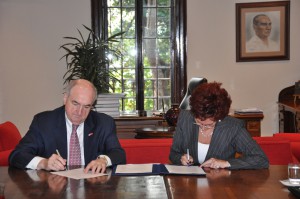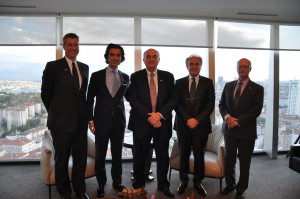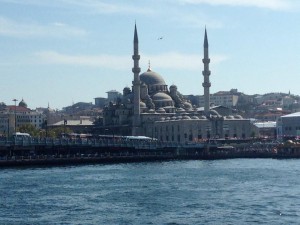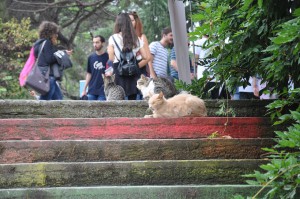History, heritage and culture in Istanbul
To look out at the beautiful and busy Bosphorus strait here in the transcontinental city of Istanbul, Turkey’s largest city, is to be simply awestruck by the convergence of centuries upon centuries of history, heritage and culture.
For nearly 16 centuries in fact, this city, which straddles Europe and Asia, served as the epicenter of four empires: the Roman Empire (330-395), the Byzantine Empire (395-1204, 1261-1453), the Latin Empire (1204-1261) and the Ottoman Empire (1453-1922). Today, Istanbul is a buzzing, modern metropolis, its marvelously eclectic skyline dotted by mosques, cathedrals, towers and other historic structures, its bustling, hilly roads lined with cafes, restaurants, shops, street vendors and countless stray, but seemingly satisfied, cats.
It’s easy to see why the cats aren’t clawing to get out: Thus far, we’ve only been in this breathtaking city a day, and already it feels as if we’ve arrived at the center of this most important part of the world.
IU’s impact in Turkey
Indiana University’s connection to the historical and economic hub that is Turkey dates back more than 70 years. Currently, IU serves as the leading center in the U.S. for the study of Ottoman and modern Turkish language; is considered to be among the nation’s premier programs for the broader study of Turkish culture and history; and features the prestigious Turkish Flagship Center, the only federally funded program in this area.
Additionally, the university welcomes roughly 100 Turkish students to its campuses each year as well as a number of visiting scholars; continues to send its own faculty and students to Turkey to teach and study abroad; and boasts two alumni chapters — one in Istanbul and the other in the capital city of Ankara — that represent nearly 500 affiliated IU Turkish alumni. This all adds up to a major IU presence in this dynamic, strategically significant part of the world, one that few other U.S. universities, if any, can match.
Building bridges in Boğaziçi
As IU seeks to expand its impact in Istanbul, around Turkey and across the larger central Asian region, the university will rely on strategic relationships with institutions that share common academic goals and interests.

IU President Michael A. McRobbie and Gülay Barbarosoğlu, president of Boğaziçi University, sign a Mevlana agreement to foster exchanges between IU and Boğaziçi.
For nearly a dozen years, IU has had a partnership with Boğaziçi University in Istanbul, which just last year celebrated its 150th anniversary. Established in 1863 as Robert College, it was the first American institution of higher education to be founded outside the borders of the U.S.
In 1971, it was transformed into Boğaziçi University, a public research university that maintained its liberal arts education tradition and reputation as Turkey’s best English language instructional program. It is now one of Turkey’s top-ranked universities, with more than 13,000 students, 1,200 academic staff and a host of exceptional programs spanning the arts and humanities, natural, social and technical sciences, economics, education and engineering.
Located in the hills of the Bosphorus — with a stunning view of Asia from the shores of Europe (and, yes, a cadre of well-cared-for cats) — Boğaziçi shares IU’s commitment to strengthening the global competencies of its faculty and students through various exchange programs. Each year, the university sends about 500 of its students overseas and welcomes an almost equal number of international students to its campus. About one in five of the university’s faculty, which includes more than a few IU alumni, came to the campus from foreign nations. (Coincidentally, about the same percentage of IU’s tenured faculty were born overseas.)
In recent years, IU and Boğaziçi have established a number of relationships between faculty and research programs in a variety of areas, including anthropology, Turkish studies and philanthropic studies.
On Tuesday, IU President Michael A. McRobbie, the first standing IU president to visit Turkey in nearly 60 years, and his counterpart at Boğaziçi University, professor Gülay Barbarosoğlu, launched the next era in this productive partnership by inking a historic Mevlana agreement. The agreement, the first of its kind signed by Boğaziçi with any other university, is part of a Turkish governmental program to provide funding for student and faculty exchanges between Turkey’s higher education institutions and their counterparts around world.
A new global gateway
IU isn’t resting on its past successes in Turkey. Instead, the university hopes to substantially expand its presence in Istanbul — and elevate Turkish studies at IU to international pre-eminence — through the establishment of a third global gateway center, for which planning is already underway. (The other two are in Beijing and just outside New Delhi.) The center will serve as a hub for IU activities in Turkey and provide faculty, staff, students and alumni, not just in this country but all across the central Asian region, with a prime gathering place to hold conferences, meetings, receptions, recruiting events, symposia and other specialized activities.
President Barbarosoğlu and her colleagues among the leadership at Boğaziçi University expressed their support for a new center that could facilitate what IU Vice President David Zaret described as “sustainable research collaborations” and more “innovative student programming” between IU and Boğaziçi.

From left to right: Eric DeHaan, associate vice president for international development at IU Foundation, IU alumnus Ekrem Ozer, IU President Michael A. McRobbie, IU alumnus Melih Araz and IU Vice President for International Affairs David Zaret.
The new center — and IU’s overall efforts to enhance its Turkish studies program — also received strong support from U.S. Consul General Charles F. “Chuck” Hunter, with whom McRobbie, Zaret and members of the IU delegation met shortly after the agreement signing at Boğaziçi.
Hunter characterized higher education in Turkey as a “booming business” and indicated that the number of universities in the country has more than doubled in just the past seven years.
“It’s astonishing how much proliferation there has been in higher ed,” he said, adding that he welcomed the “opportunity for another frontline institution like IU” to establish a permanent presence in Turkey to raise the nation’s educational capacity and generate greater human capital.
“There will be a lot to keep that office busy,” IU alumnus Melih Araz told members of the IU delegation later in the afternoon. Araz, who received his MBA from the Kelley School of Business in 1972, served as a longtime executive at Citibank in Istanbul and is now managing director of Ata Invest, a full-service securities firm with offices in New York, Istanbul and Dubai.
In his 20th-floor office overlooking the beautiful Bosphorus and architecturally amazing Istanbul city scape, Araz reminisced about his days at IU, where he and his wife lived during their first two years of marriage; the Kelley School; Hoosier football and basketball; and Olympian Mark Spitz. Speaking of his travels from Istanbul to Indiana, he said: “It took my wife and I three days to get to Bloomington … in those days, the U.S. was far, far away.”
Today, though, Istanbul and Indiana never seemed closer.
Tags: Bogazici University, Bosphorus, Charles F. Hunter, David Zaret, Ekrem Ozer, Gulay Barbarosoglu, Istanbul, IU Global Gateway Network, IU Turkish Flagship Center, Melih Araz, Michael A. McRobbie, Turkey




